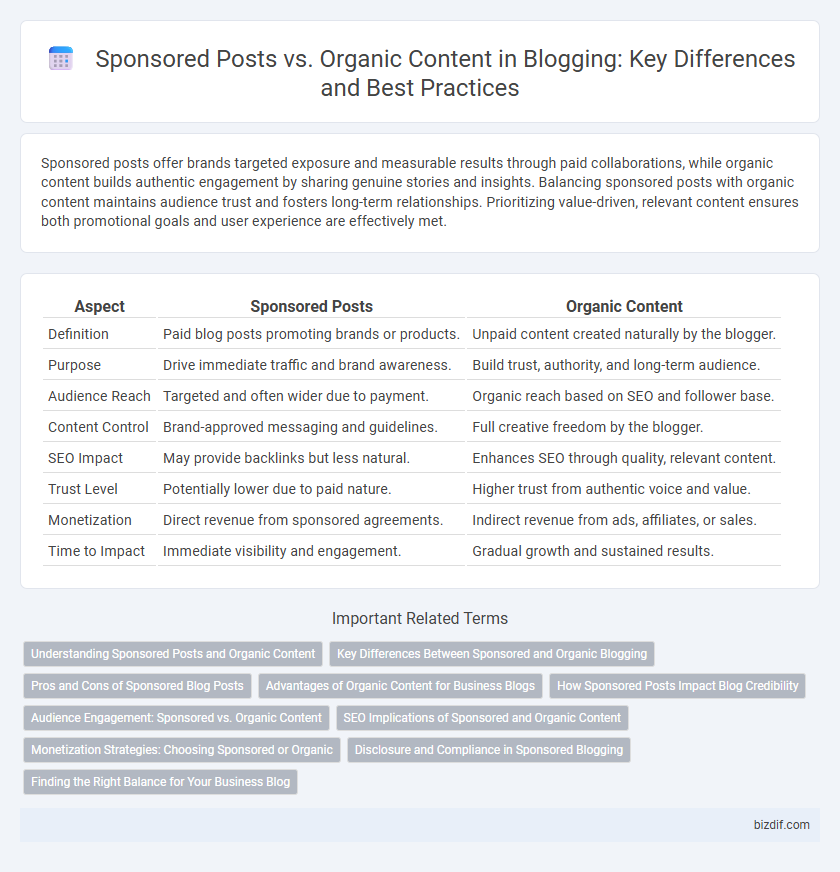Sponsored posts offer brands targeted exposure and measurable results through paid collaborations, while organic content builds authentic engagement by sharing genuine stories and insights. Balancing sponsored posts with organic content maintains audience trust and fosters long-term relationships. Prioritizing value-driven, relevant content ensures both promotional goals and user experience are effectively met.
Table of Comparison
| Aspect | Sponsored Posts | Organic Content |
|---|---|---|
| Definition | Paid blog posts promoting brands or products. | Unpaid content created naturally by the blogger. |
| Purpose | Drive immediate traffic and brand awareness. | Build trust, authority, and long-term audience. |
| Audience Reach | Targeted and often wider due to payment. | Organic reach based on SEO and follower base. |
| Content Control | Brand-approved messaging and guidelines. | Full creative freedom by the blogger. |
| SEO Impact | May provide backlinks but less natural. | Enhances SEO through quality, relevant content. |
| Trust Level | Potentially lower due to paid nature. | Higher trust from authentic voice and value. |
| Monetization | Direct revenue from sponsored agreements. | Indirect revenue from ads, affiliates, or sales. |
| Time to Impact | Immediate visibility and engagement. | Gradual growth and sustained results. |
Understanding Sponsored Posts and Organic Content
Sponsored posts are paid content created to promote a brand, product, or service, often labeled to maintain transparency with the audience. Organic content is authentic, unpaid material generated to engage readers naturally without direct advertising intentions. Distinguishing between sponsored posts and organic content helps maintain content credibility and ensures effective audience targeting in blogging strategies.
Key Differences Between Sponsored and Organic Blogging
Sponsored posts are paid content designed to promote a brand or product, typically featuring clear disclosure and targeted messaging, while organic content is created to engage readers naturally without direct compensation. Sponsored posts often prioritize marketing goals and call-to-action elements, whereas organic content focuses on delivering valuable, authentic information to build long-term trust and audience loyalty. The key difference lies in intent and transparency, with sponsored content aiming for immediate conversions and organic content fostering genuine connections and sustained reader engagement.
Pros and Cons of Sponsored Blog Posts
Sponsored blog posts provide targeted exposure and can generate immediate revenue by partnering with brands, enhancing monetization opportunities for bloggers. However, they may risk compromising editorial independence and could alienate readers if promotional content appears overly biased or frequent. Balancing sponsored posts with authentic organic content is critical to maintaining audience trust and long-term engagement.
Advantages of Organic Content for Business Blogs
Organic content drives authentic engagement by building trust and credibility with the target audience, leading to higher long-term brand loyalty. It improves search engine rankings through consistent use of relevant keywords and quality backlinks, enhancing visibility and attracting sustainable website traffic. Businesses benefit from cost-effective content marketing since organic posts require no direct payment for placement, maximizing ROI over time.
How Sponsored Posts Impact Blog Credibility
Sponsored posts can influence blog credibility by introducing potential bias, as readers may question the authenticity of content influenced by paid partnerships. Maintaining transparency through clear disclosure of sponsored content helps preserve trust and reinforces ethical blogging standards. Consistently balancing sponsored posts with genuine organic content ensures a credible and reliable reader experience.
Audience Engagement: Sponsored vs. Organic Content
Audience engagement typically peaks with organic content due to its perceived authenticity and genuine value, fostering stronger trust and interaction from readers. Sponsored posts can generate engagement but often face skepticism, leading to lower click-through rates and reduced sharing when compared to organically created content. Effective bloggers balance both approaches to maintain audience interest while monetizing their platform.
SEO Implications of Sponsored and Organic Content
Sponsored posts often incorporate paid keywords and backlinks, which can improve short-term SEO visibility but may risk penalties if perceived as manipulative by search engines. Organic content emphasizes natural keyword integration and genuine engagement, fostering long-term search rankings and domain authority through authentic user interactions. Balancing sponsored content with quality organic posts is crucial for maintaining SEO integrity and sustaining website traffic growth.
Monetization Strategies: Choosing Sponsored or Organic
Monetization strategies in blogging require weighing sponsored posts against organic content to maximize revenue. Sponsored posts offer direct payment opportunities from brands seeking targeted exposure, while organic content builds trust and long-term audience engagement essential for affiliate marketing and ad revenue. Selecting the right balance depends on niche relevance, audience preferences, and the blogger's monetization goals to optimize both short-term income and sustainable growth.
Disclosure and Compliance in Sponsored Blogging
Sponsored posts require clear and prominent disclosure to comply with advertising regulations such as the FTC guidelines, ensuring transparency and maintaining audience trust. Organic content, by contrast, does not involve paid promotion and thus typically lacks mandatory disclosure, emphasizing authenticity and unbiased information. Proper compliance in sponsored blogging not only protects the blogger from legal issues but also fosters credibility and long-term engagement with readers.
Finding the Right Balance for Your Business Blog
Achieving the right balance between sponsored posts and organic content is essential for maintaining your business blog's credibility and audience engagement. Sponsored posts provide valuable monetization opportunities and brand partnerships, while organic content builds trust through authentic storytelling and SEO benefits. Regularly analyzing audience feedback and performance metrics helps tailor the mix for sustained growth and relevance.
Sponsored Posts vs Organic Content Infographic

 bizdif.com
bizdif.com